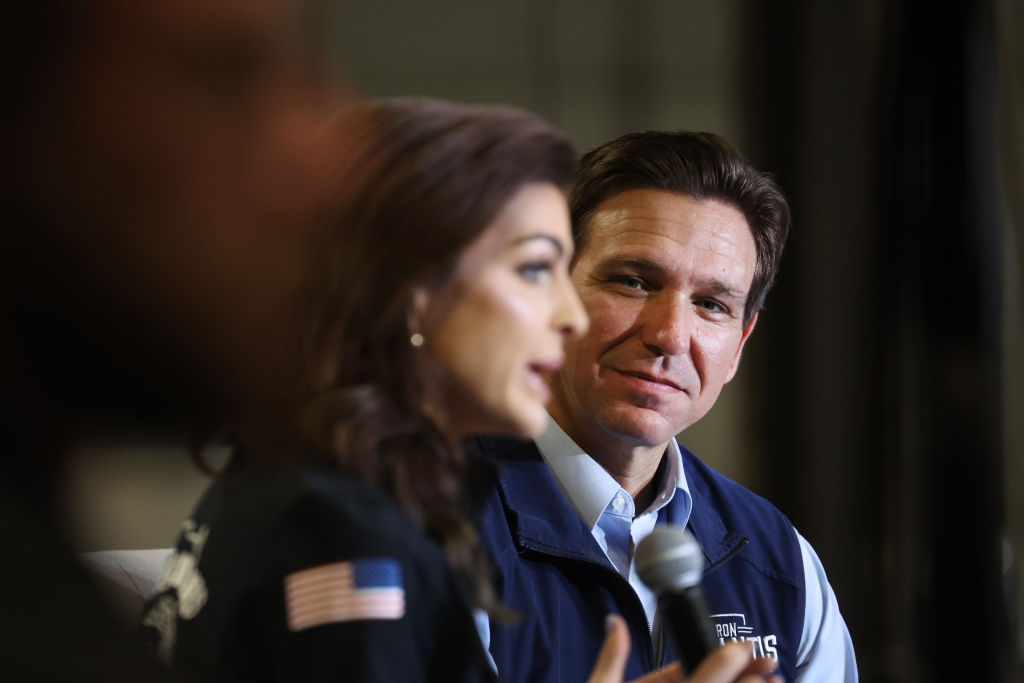COUNCIL BLUFFS, Iowa—Ron DeSantis delivers his stump speech with all of the conviction of a preacher and none of the charisma. But Republican voters showing up in the Hawkeye State to see the Florida governor are entranced.
“I thought it was pretty amazing,” said Liz Helle, 55, after hearing DeSantis speak for close to an hour at a campaign rally in Council Bluffs last week. “We’re Trump supporters, but we thought we’d come out here, just say we were there, see what he had to say. I’m telling you, DeSantis is fantastic.” Fantastic enough to switch their support to DeSantis from former President Donald Trump? “Absolutely,” said Helle and her companion, Guy Brockey, 58, both clad in Harley Davidson gear.
“There’s definitely going to be some things to think about,” explained Helle, who works for the local Walmart and was among the more than 500 people in attendance here. “I’m telling you, based on today’s speech, if the vote was supposed to be today, I’d probably go for DeSantis.”
How, or whether, DeSantis can vault from a distant second place in the race for the Republican nomination to the winner’s circle is being hotly debated in GOP circles. But his inaugural campaign swing across Iowa—five events over 24 hours before heading to New Hampshire and South Carolina—began to reveal what kind of candidate he is, and how he plans to get from here to there.
The governor will have to convert many more Trump supporters to catch the former president in the polls, hold off other Republicans in the race gunning for him, and win the Iowa caucuses, the first contest on the GOP’s 2024 nominating calendar. And he’ll have to do it in communities like Council Bluffs, a southwest Iowa battleground where support for Trump runs deep.
DeSantis, captain of his varsity baseball team at Yale and a Navy veteran who volunteered to serve in the Iraq war, delivers his articulate stump speech in a no-frills, businesslike manner, as if detailing a quarterly financial report to a corporate boardroom. He speaks with few emotional inflections to signal important passages, inserts little self-deprecating humor, if any, and rarely gets sidetracked or ad-libs.
But DeSantis does offer his audience ear-tickling content—in spades. He doesn’t attack Trump head-on, instead making just a few oblique references to the former president’s shortcomings, noting the GOP’s struggles in recent national elections, and admonishing those who use politics for personal brand-building.
The topics he does address overtly, and repeatedly, include the coronavirus pandemic and COVID vaccines, election reform, the scourge of the administrative state in Washington, tax cuts, public education, the danger posed by a rising China, limiting abortion rights, opposing gender-affirming medical services to minors who identify as transgender, prohibiting transgender girls participating in female sports, and rejecting “wokeism,” a particular crowd favorite.
And each item the governor ticks off the list is eventually met with some variation of: “We’ve done that in Florida,” as he told a few hundred supporters during a rally at a welding plant in Salix, near Sioux City, in northwest Iowa. It’s a dominant theme in the governor’s campaign speeches so far: not promising what he will do if elected, but promising more of what he has already done “when” he gets to the White House.
That message gives DeSantis the imprimatur of authenticity, key to political success in the Trump era.
Iowa Republicans are responding, regularly interrupting his speeches with applause and cheers, and the occasional standing ovation. “He stood up and did the things he had to do—in the nation—down in Florida,” said Don Stevens, 76, a retiree from Sioux City who is leaning toward backing DeSantis in the caucuses. “When everybody was going in the other direction, he handled COVID great. He seems to be able to manage the state tremendously.”
Dale Klein, 59, a physician in Sioux City, described the governor as “no-nonsense; common sense” and said that’s why he might vote for him. Klein,who voted for Trump in 2016 but did not vote for a presidential candidate in 2020, provided another reason, impromptu, for giving DeSantis a look: “I like his wife.”
Indeed, Florida first lady Casey DeSantis is going to play a major in the governor’s campaign. She didn’t introduce her husband ahead of his speeches at each stop in Iowa—she spoke smack in the middle of them: He invited her up about midway through his address, and she delivered her own mini-address, without notes. Then the governor finished his own remarks. Afterward, both DeSantises mingled with voters—separately, drawing near-equal attention. The governor noticeably lights up when they’re together on stage, the exception to his otherwise disciplined reserve.
In that way, the first lady softens her husband’s rough edges even without saying a word about their marriage and their three young children, which she does often. But just like him, she is relentlessly on-message.
“I get a lot of questions when I’m out with the better half and one of them is: ‘We see him as a fighter on TV; we see him as the guy standing up for our rights. But when he goes to Washington and he’s entrenched up there in the swamp, how do we know that he’s going to be able to stay strong?’” Casey DeSantis said in Council Bluffs. “I can tell you, having watched him in front of the cameras and then watching him behind the scenes, I can tell you that Ron DeSantis always stands up for what’s right. He never backs down.”
DeSantis became a national—and at times polarizing—figure during the coronavirus pandemic as he bucked the lockdowns and school closures encouraged by federal officials and adopted by many other governors, including some Republicans. After winning reelection last November in a landslide in what had been a perennial swing state, he was labeled a front-running presidential contender. That was followed up by a promotional tour and media blitz for a new book.
But strategically, the DeSantis campaign is treating its candidate’s rollout as though he were an unknown, a senior official told The Dispatch on Friday.
The goal is simply to introduce him to voters. Hence campaign speeches in the Hawkeye State last week that ran close to an hour. DeSantis took the time to detail his personal background and rather lengthy governing record in Tallahassee as well as lay out his case for ousting President Joe Biden (and subtly, his case against Trump).
DeSantis followed each speech by shaking hands, posing for selfies, and chit-chatting with voters, the necessary retail politicking that he generally avoided before running for president. But he hosted no town hall meetings, where voters could pepper him with unscreened questions. Such events are a staple of campaigning in the key early primary states and considered a prerequisite for excelling at the ballot box. Reporters are making an issue of this omission from DeSantis’ Week 1 itinerary, and so are his opponents.
“Now more than ever, Americans need a leader who can handle the tough questions,” SFA Inc., the super PAC supporting former U.N. Ambassador Nikki Haley, said in a press release.
The DeSantis campaign shrugged off the criticism, declining to say whether town hall meetings are on tap for upcoming visits to Iowa, New Hampshire, South Carolina and Nevada. What is? More news conferences with local and national media. That’s not insignificant.
During a news conference in suburban Des Moines last Tuesday, nearly all of the approximately half-dozen questions the governor fielded were related to the former president. DeSantis and his senior campaign aides are well aware exchanges with the media will likely continue to revolve around his intramural battle with Trump. Their commitment to regular, formal news conferences signals DeSantis is embracing confrontation with him, which some of the other candidates in the race are studiously avoiding.
“The governor will continue to campaign in a variety of different formats, engaging directly with voters and the media—just as he did this last week,” the senior DeSantis campaign official said in a text message.









Please note that we at The Dispatch hold ourselves, our work, and our commenters to a higher standard than other places on the internet. We welcome comments that foster genuine debate or discussion—including comments critical of us or our work—but responses that include ad hominem attacks on fellow Dispatch members or are intended to stoke fear and anger may be moderated.